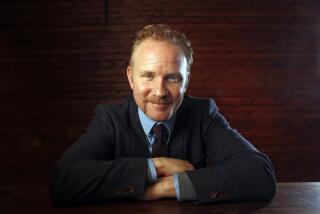Social mcnuggets
- Share via
Morgan Spurlock, who made himself sick for our sins, eating only McDonald’s for a month to spotlight the health risks of fast food consumption in his documentary “Super Size Me,” is back with a similar gambit -- a TV series called “30 Days.” The show, which premieres Wednesday on the FX cable channel, takes the extreme-immersion-as-social-commentary angle in “Super Size Me” and franchises it out into half-hour segments. Inherent in each episode is a message.
In one episode, a family man, trying to regain his college physique, agrees to undergo 30 days on diet supplements and growth-hormone and testosterone shots; he begins to look better but also becomes irritable, and his sperm count drops off a cliff. In another one, a devout Christian agrees to spend a month with a devout Muslim family, following their traditions of dress and prayer; he’s immediately searched in an airport and later, despite the reassurances of his Imam, panics that he’s repudiating his own God.
Spurlock is the narrator in these episodes; in tonight’s debut, however, he and his fiancee, Alexandra Jamieson, a vegan chef, are the guinea pigs, leaving New York City for Columbus, Ohio, to see what it’s like to live on minimum-wage jobs. It’s a copy of the conceit behind Barbara Ehrenreich’s book “Nickel and Dimed,” in which Ehrenreich took work as a waitress, housecleaner and Wal-Mart clerk to highlight how out of touch the federal minimum wage, which hasn’t been adjusted in eight years, is with the cost of living in America.
Spurlock, who has a Fu Manchu mustache and seems to prefer himself in winter, wearing ski caps, has a mischievous nose for stacking the deck without appearing to. For his minimum-wage experiment, he chooses winter in the most contested of the swing states during the 2004 presidential election. Working construction jobs, he makes about 45 bucks for an 11-hour workday; Alexandra washes dishes at a coffee shop. Soon enough, their hardscrabble life in an ant-infested apartment gets harder, as she gets a urinary tract infection and Spurlock injures his wrist. The free clinic is overcrowded, so both end up in the emergency room -- and deeply in arrears when the bills arrive at the end of the episode.
“We live in the richest country in the world and this is our bank,” Spurlock says, shaking a sad coffee can for emphasis.
There’s something dilettantish about this couple -- he the Oscar-nominated filmmaker, she the vegan chef -- sharing a bus pass and dabbling as the working poor. But Spurlock has a certain populist flair; his way of affecting attitude change is to present hardship almost as vicarious fun, like eco-tourism for the middle class -- you have to go and see, to experience the environment and live among the people, as a way of waking up perspective. It can make Spurlock, who is from West Virginia (he tends to remind you) a more likable provocateur than Michael Moore, whose rage, played often as comedy, is more palpable. Spurlock’s approach is, ultimately, a more self-oriented, youth-culture approach to agitprop, because it appeals to that subset of people who have the time and inclination to seek romantic enlightenment in how the other half lives -- and also, of course, to get far away from their immediate family members.
“Super Size Me” -- a great, catchy title, with the feeling of a phrase put into the vernacular -- put Spurlock on the map as a nonfiction filmmaker with an MTV edge (in “30 Days,” as in “Super Size Me,” the cautionary statistics go by in a whir of cool animation and graphics, Spurlock narrating in a “check this out” tone). Like Moore, an obvious influence (and who had two TV series of his own, “TV Nation” and “The Awful Truth”), Spurlock makes documentaries about himself, about his worldview on an issue more than the issue itself. It’s why some saw “Super Size Me” not as entertaining social commentary -- its true essence -- but as some invalid, agenda-laden science experiment. Of course he had an agenda -- the guy vomited a Quarter Pounder with cheese out the window of his truck, on camera, gained 25 pounds, skyrocketed his cholesterol and fattened up his liver, all to zing a big corporation and to drive home the point that Americans are consuming way too many Big Macs, Chicken McNuggets, Egg McMuffins, fries and 42-ounce sodas.
Who cares if he could have mixed in a salad? “Super Size Me” was storytelling, the film part of a wave of recent documentaries demonstrating that actual life can yield the same artistic possibilities that fiction once owned.
But as a reality-show spinoff, “30 Days” isn’t as fresh, both because Spurlock’s not in it enough and because the “Super Size Me” premise, superimposed onto other topics, doesn’t hold up as well. And so you can begin to feel trapped in the premise. The actual people used aren’t as camera-savvy as Spurlock, and the outsourcing of the role hurts the series.
Although I have to say the episode in which a West Virginia insurance salesman and practicing Christian named Dave goes to live with the Haques of Dearborn, Mich. -- “the most densely populated Muslim community in America,” Spurlock tells us -- does yield some moments.
“Do you guys think it’s possible that there’s any, like, sleeper-cell activity around here?” he asks his host family, over dinner. Meanwhile, Dave can’t get to a place of trust with Imam al Husaini at the Karbalaa Islamic Education Center. Spurlock, off camera, keeps upping the ante. Dave has to collect signatures for a petition to stop the racial profiling of Muslim Americans. It feels like a stunt, which of course it is -- a stunt with a larger purpose. Spurlock once produced an MTV show several years ago called “I Bet You Will,” described as a series “filmed at various spring break locations” that “proves people will do anything for money.”
In “30 Days,” he takes the reality show -- still stuck in the anything-for-money premise, largely -- and gives it a more humanistic canvas. It’s “Super Size Me,” the play-it-at-home version.
More to Read
The complete guide to home viewing
Get Screen Gab for everything about the TV shows and streaming movies everyone’s talking about.
You may occasionally receive promotional content from the Los Angeles Times.






